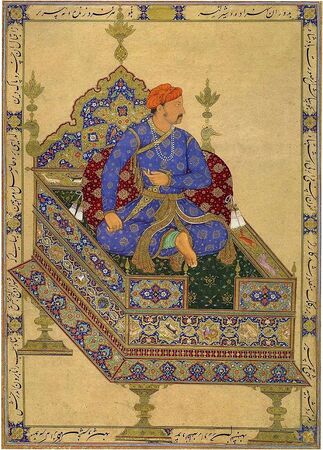- A Jahangir
- B Akbar
- C Shah Jahan
- D Aurangzeb
- Share this MCQ

Mirza Nur-ud-din Beig Mohammad Khan Salim, known by his imperial name Jahangir (Persian for "conqueror of the world" (31 August 1569 - 28 October 1627)), was the fourth Mughal Emperor who ruled from 1605 until his death in 1627. Much romance has gathered around his name (Jahangir means 'conqueror of the world', 'world-conqueror' or 'world-seizer'; Jahan = world, gir the root of the Persian verb gereftan, gireftan = to seize, to grab), and the tale of his relationship with the Mughal courtesan, Anarkali, has been widely adapted into the literature, art and cinema of India.
Jahangir was the eldest surviving son of Mughal Emperor Akbar. Impatient for power, he revolted in 1599 while Akbar was engaged in the Deccan. Jahangir was defeated but ultimately succeeded his father as Emperor in 1605 because of the immense support and efforts of his step-mothers, Empress Ruqaiya Sultan Begum, Salima Sultan Begum and his grandmother, Hamida Banu Begum. These women wielded considerable influence over Akbar and favoured Jahangir as his successor. The first year of Jahangir's reign saw a rebellion organized by his eldest son Khusrau. The rebellion was soon put down; Khusrau was brought before his father in chains. After subduing and executing nearly 2000 members of the rebellion, Jahangir blinded his renegade son.
Jahangir built on his father's foundations of administration and his reign was characterized by political stability, a strong economy, and cultural achievements. The imperial frontiers continued to move forward-in Bengal, Mewar, Ahmadnagar and the Deccan. Later during his rule, Jahangir was battling his rebellious son Khurram in Hindustan. The rebellion of Khurram absorbed Jahangir's attention, so in the spring of 1623 he negotiated a diplomatic end to the conflict. Much of India was politically pacified; Jahangir's dealings with the Hindu rulers of Rajputana were particularly successful, and he settled the conflicts inherited from his father. The Hindu rulers all accepted Mughal supremacy and in return were given high ranks in the Mughal aristocracy.
Click me to Read more Question & Answer ofShare this MCQ
 Vedic period
Vedic period  Jainism
Jainism  Buddhism
Buddhism  Advent of Europeans
Advent of Europeans